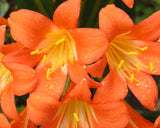
PASSIONFLOWER CULTURE (Passiflora sp.)
Here are some general "Growing 101" tips to help with growing your new passiflora vine.
For more reference, please see Ulmer & MacDougal's excellent book Passiflora: Passionflowers of the World and John Vanderplank's Passion Flowers. Click here for more information.
Light: Passiflora like a lot of light for good growth and blooming. Full sun is best. They tolerate shade, but will bloom less. In climates where the summers are extremely hot, afternoon shade is recommended.
Important: Your plants have been growing in a climate-controlled greenhouse. DO NOT put them into full-sun immediately after unpacking. They will need time to adjust to outside light levels, so start by putting them outside under a dense tree or other shady area for a week first.
Fertilizer: For the best bloom, avoid high nitrogen fertilizers that push vegetative growth at the expense of flowers. If you are growing your passionflowers in pots, some fertilizer will definitely help your plant do its best. Fertilizing plants in the ground is probably not necessary. Avoid fertilizing in the fall when the plant is getting ready to go dormant. Lush growth from late fertilizing could make the plant susceptible to damage from early cold weather.
Soil: Passionflowers will grow in very poor soil, but it is very important that it is well-drained. Passionflowers tend to get root rot. If they are being grown in pots, any peat-based potting soil should work fine. Also, for best growth, your plant should eventually be transplanted into a 5 gallon size pot.
Watering: Your plant will signal when it needs water, so make sure to give it plenty in the summer when it is hot. It may be helpful to spray the whole vine with water when the temperatures get past the high eighties. If the plants are being grown in the ground, deep watering less often is preferred over frequent, shallow watering. This will encourage the vine to develop a deep root system that will be more resistant to drought.
NOTE: Passilfora lutea is an herbaceous species that dies completely down to the ground every fall. Don’t become concerned, it will sprout back in the spring.
PRUNING QUESTION. I live in NorCal Zone 9b. I had a beautiful passion flower which got pretty tangled because I was always worried about pruning (and losing next year’s bloom), however I did not like how the lower woody part (about 1.5 inches diameter) had split apart in the first foot of growth. Then I read somewhere cut your passion flower to the ground in winter and I cut it to 2 inches above the ground. It is now April and no sign of new growth! I have not given up on it yet, because it was several years old and well established. However, I just purchased ‘Raspberries and Cream’ from Grassy Knoll and I would really like to know how to properly prune it. Is there a passion flower pruning 101 somewhere?
Howard Hawhee
do as I do — buy a tiny paint brush and play honey bee.. I have 50 to 75 fruits from the blue incarnata — I make passion cheese cake from the fruit..
this blue passion vine loves to invade my neighbors property — it will pop up about 10’ from the host plant — then next month 20’ – its like it can see the building and doesn’t stop till it finally reaches the house,shed,tree,or bushes..
This is a question, are there any passion flowers that would survive and bear fruit in zone 6? I live about mid way in Ohio close to the east end. The flowers are amazing but I don’t have the space or lighting to over winter them inside.
We are in the Austin, Texas area and have rampant passion vine (dies back in the winter, comes back every summer). It’s the passion vine that you see all over the place in central Texas, and from coloring I assume it’s passiflora incarnata. Having lived in South America, I am a big fan of the fruit, but I think in the whole seven years we’ve lived at this place there have been maybe two fruits with disappointing contents. Is there a better variety for our area that will fruit more dependably? Or is there something we should be doing? (hand pollinating). I think we had Gulf Fritillaries the first few years, but I’m not sure we’ve seen them since.
Comments will be approved before showing up.

Since we ship our plants, they may be a little more stressed than if you were to pick them up at your local...


Here are some general "Growing 101" tips to help you with growing your new Clivia plants.
Clivia make excellent houseplants or landscape plants in ...
Elizabeth Peters
Author